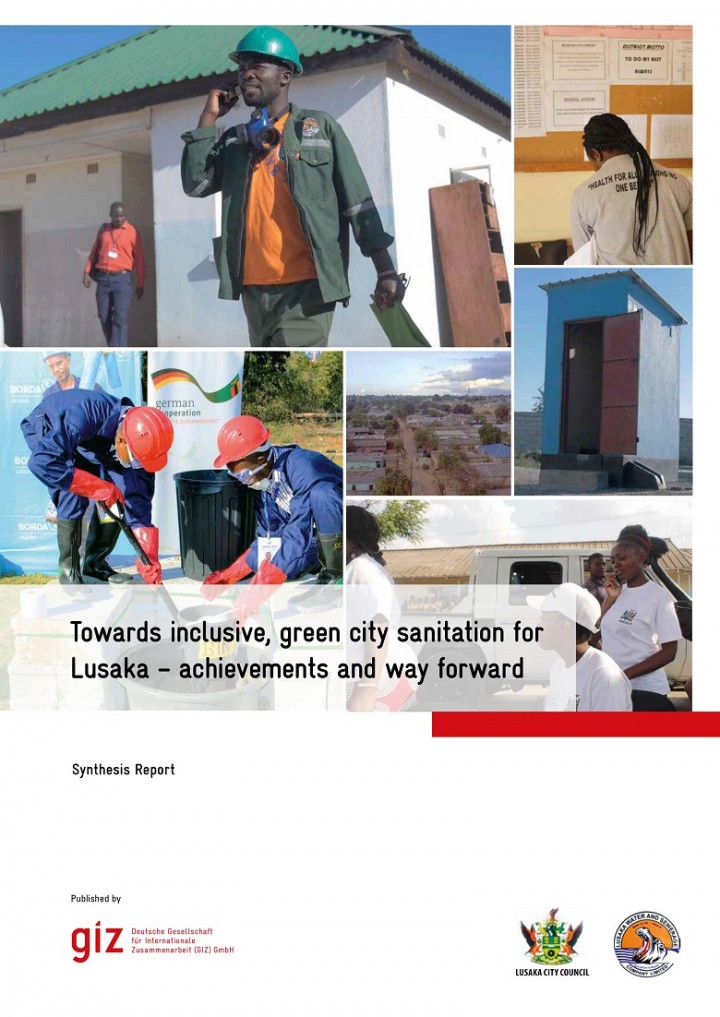Towards inclusive, green city sanitation for Lusaka – achievements and way forward
Gerlach, E., Mallaghan, A., Mbalo, D., Büürma, M., Surridge, T. (2020)

Published in: 2020
Pages: 56
Publisher:
Deutsche Gesellschaft für Internationale Zusammenarbeit (GIZ) GmbH, Eschborn, Germany
Author:
Gerlach, E., Mallaghan, A., Mbalo, D., Büürma, M., Surridge, T.
Uploaded by:
SuSanA Admin
Partner profile:
Deutsche Gesellschaft für Internationale Zusammenarbeit (GIZ) GmbH
4657 Views
389 Downloads
Location of library entry
From December 2016, the German-funded project ClimateFriendly Sanitation Services in Peri-Urban Areas of Lusaka (CFS-Lusaka) implemented by GIZ on behalf of the German Federal Ministry for Economic Cooperation and Development (BMZ) supported stakeholders to strengthen on-site sanitation (OSS) and safe faecal sludge management (FSM) in the fast-growing Zambian capital within the context of the multi-donor Lusaka Sanitation Programme (LSP). Poor sanitation practices had been identified as a major risk factor for public health and vulnerable groundwater resources. Cholera outbreaks, erratic weather patterns induced by climate change and more frequent flooding events demanded a rethink of conventional urban sanitation concepts. Lusaka needed to look beyond networked sewerage to achieve ambitious national sanitation targets and its aspirations for a ‘greener’ city. Reaching low-income households in the city’s peri-urban areas was going to be key to ensuring safe and environmentally responsible faecal sludge management.
CFS-Lusaka has helped strengthen and scale up the concept of a sanitation service delivery chain and integrated end-toend service delivery. Lessons learnt and recommendations are offered not only for Lusaka to move forward on its sanitation journey, but also as a set of key messages to inform global practice and conceptual thinking: together with Lusaka City Council’s Public Health Department as well as the commercial utility Lusaka Water and Sanitation Company, CFS-Lusaka has championed ‘inclusive green city sanitation’, demonstrating the suitability of climate-friendly FSM practices for accelerating service expansion into low-income areas. By integrating a climate focus into sector reform approaches that promote and prioritise pro-poor infrastructure and services, the project has been supporting goals for sustainable development at local, national and international level.
This report reflects on progress and impact of the various CFS-Lusaka activities, all of which emphasised stakeholder coordination, awareness raising and capacity development. Five specific focus areas included creating an enabling framework for OSS and FSM, formalising service delivery and developing the capacity of the sanitation workforce, as well as financing and funding, and explicitly looking at sanitation from a climate perspective. Discussing these in turn, the report takes stock of achievements so far and the challenges that remain with regard to (1) Enabling framework for on-site sanitation and faecal sludge management, (2) Scaling up safely managed on-site sanitation services, (3) Workforce competencies and employability, (4) Sustainable financing and funding for OSS and FSM, and (5) Sanitation and climate, this report takes stock of achievements so far, the potentials such as increased funding and financing, and the challenges that remain.
These five focus papers can be found as part of the overall publication as well as in the form of individual papers.
Bibliographic information
Gerlach, E., Mallaghan, A., Mbalo, D., Büürma, M., Surridge, T. (2020). Towards inclusive, green city sanitation for Lusaka – achievements and way forward. Deutsche Gesellschaft für Internationale Zusammenarbeit (GIZ) GmbH, Eschborn, Germany
Filter tags
English Urban (entire city)















